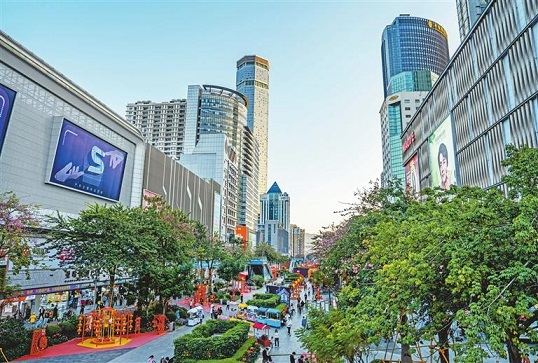Shenzhen
 2024/6/13
2024/6/13
 source: Shenzhen Daily
source: Shenzhen Daily
 Print
Print

A scene of Huaqiangbei in Futian District. Lin Jianping
Wei Jie claudiamente@hotmail.com ON Saturday, the first day of the three-day Dragon Boat Festival holiday, stores in the Huaqiang Electronics World market in Huaqiangbei Subdistrict, Futian District, were packed with tech aficionados examining the recently released PodsPro earbud and young people looking for other electronic novelties. The PodsPro earbud developed in Huaqiangbei comes with a charging case equipped with a touch screen that allows users to control volume, the music playlist, and even sound effects. These innovative features are reminiscent of the yet-to-be-released Apple AirPods Pro 3, which won’t hit the market until next year. “You can even customize your charging case with personalized wallpaper on the touch screen,” said a man who identified himself as Chen. “It feels like discovering a whole new world the more you play with them.” Multifaceted industrial center From time to time, Huaqiangbei wows the local tech community with novel, homegrown products like the PodsPro, and it has become a magnet for innovative minds from around the world. After years of development, Huaqiangbei has transitioned from an electronics marketplace to a multifaceted industrial center for the introduction and exchange of technology, product development and release, and much more. Huaqiangbei is currently home to 14 incubation platforms that accommodate more than 500 maker teams. Henk Werner, a maker from the Netherlands, started the TroubleMaker space in Huaqiangbei in 2016. TroubleMaker has attracted enthusiastic makers from over 20 countries since opening, and more than 16,000 people visited the space between May 2016 and December 2019. Werner, who relocated the space to Bao’an District in 2021, has chosen to return to Huaqiangbei because it has everything makers need to develop novel products, including a comprehensive industrial chain that helps makers commercialize their new inventions. He has secured an ideal space for TroubleMaker at the Black Ark, and a reboot party is scheduled for June 22. “Huaqiangbei’s reputation for having a full range of electronic components available, high efficiency, and a complete industrial supply chain remains unparalleled. If there is a particular electronic part that you can’t find in Huaqiangbei, chances are slim that you’ll find it elsewhere in China,” said a senior staffer with the Huaqiangbai Subdistrict Office. Efficiency a tangible asset When Chen Haotian decided to embark on his entrepreneurial journey in the Guangdong-Hong Kong-Macao Greater Bay Area with a group of like-minded young people returning from overseas, it didn’t take them long to decide to establish their company, Elephant Robotics, in Huaqiangbei in 2016. “I think what we need is a complete supply chain to help us pull it off,” said the entrepreneur who returned from Australia. “Being fast is crucial for enhancing market competitiveness in the electronics industry,” Chen said. When explaining exactly how fast things happen in Huaqiangbei, Chen said that Elephant Robotics decided to release a bionic pet panda last year after similar bionic toys became a hit in Europe in 2022. In just three days, Chen and his colleagues managed to source 100 key components needed for the production of their product. Within a week, they were able to develop a prototype that was ready for mass production. Dubbed “China’s No. 1 Electronics Street,” Huaqiangbei hosts 22 specialized electronics markets that offer more than 1 million electronic components within a compact 1.45-square-kilometer area. Official figures show that Huaqiangbei employs approximately 150,000 people and has an annual turnover exceeding 200 billion yuan (US$27.78 billion). Electronics hub Huaqiangbei, which means Huaqiang North, was originally a road named after Huaqiang Electronics Industrial Co., a company founded in 1979 to assemble foreign electronic products. To address a shortage of electronic components, the SEG Electronics Market — the first of its kind in China — opened in Huaqiangbei in 1988. Roughly 200 electronic companies of various types were established there. The opening of the Huaqiang Electronics World market in 1998 solidified Huaqiangbei’s leading status and served as one of its central pillars, along with SEG. At its zenith, the line of enterprising individuals eager to register their businesses there was 500 meters long. A popular anecdote from that era provides a glimpse into the magnetic appeal of Huaqiangbei: A man purchased 30,000 pieces of electronic components in Hong Kong that were disposed of by Motorola at the dirt-cheap price of 0.3 yuan per piece. He then sold them a year later for 27 yuan per piece. In one year, the man earned about 800,000 yuan at a time when the average monthly salary of a Shenzhener was only several hundred yuan.





